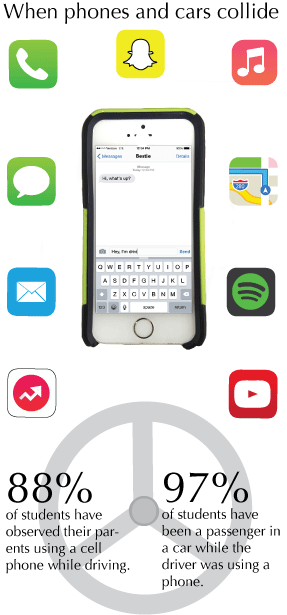Cell phone usage while driving can lead to fatal accidents
Using a cellular device behind the wheel creates a dangerous distraction for all drivers.
October 1, 2015
The enticing ring of a cell phone notification can be distracting to drivers of all ages, but giving into the temptation of personal devices on the road can lead to serious accidents that may even result in death.
“Sometimes if I’m reaching for my cell phone, I don’t look at the road, and I swerve,” senior Kate Carson said. “I’ve definitely almost rear-ended people when I’m reaching for it. Texting or Facebook notifications are the most distracting on my phone, because I really want to see who’s trying to contact me.”
Approximately 660,000 people use electronic devices while driving throughout the day, according to the National Highway Traffic Safety Administration (NHTSA).
Texting is among the most risky distractions for drivers because it includes cognitive, manual and visual distractions. Sending a text message can take a driver’s attention off the road for an average of five seconds, while it only takes three seconds for a potentially fatal crash to occur, according to the Federal Motor Carrier Safety Administration.
“Cell phones are one of the biggest distractions,” attorney Lauren Pietsch, who has represented victims of distracted drivers, said. “A driver can be distracted by really anything. But with your phone, it’s always there.”
Over 25 percent of all car crashes involve cell phone use by the driver, including hands-free cellular devices. Despite popular belief, hands-free devices are not significantly safer than hand-held phones and lead to the same distractions for drivers, according to the National Safety Council.
The brain is unable to multitask and can only process one action at a time, even with the driver’s eyes on the road and both hands on the wheel. Talking on a cell phone decreases the brain’s ability to process surroundings by one-third, according to NSC.
“I was almost in an accident because of cell phone usage,” history teacher Michael Stafford said. “It was scary. It was really minor. I was turning right at a stoplight, and the person started to go and stopped, and I was distracted a little by my cell phone.”
Young people are more likely to continue driving instead of pulling over to use their cell phone for texting and calling and report more crashes associated with cell phone use than any other age group, according to the NHTSA.
“Cell phone use in general tends to be generational,” Pietsch said. “It seems pretty common for younger and middle age groups to use their phones while driving, but it’s likely for elderly individuals.”
Teens whose parents participate in common driving distractions are more often involved in similar distractions while driving. Sixty percent of parents reported to have used a cell phone behind the wheel, corresponding with over half of the teens who disclosed doing so as well in a University of Michigan and Toyota nationwide study involving teen drivers and their parents.
“Kids can be influenced by their parents in anything,” Pietsch said. “If parents set a good example and make it a point to not go on their phones while driving, I think that definitely passes down to the kids. On the flip side, if parents text or use their phone while driving when their kids are in the car, it sends the message that texting and driving is perfectly okay to do.”
While no state prohibits the use of all cellular devices, including hands-free, by all drivers, 14 states restrict hand-held devices while driving and 46 restrict text messaging, including California.
“If there is evidence that the police can use or if a police officer actually sees someone using their phone while driving, they’ll cite the driver,” Pietsch said. “You have to pay a fine and you have to go to court. If you do happen to cause an accident while using your cell phone and the police have proof of that, then there can be more extensive penalties.”
Multiple organizations and campaigns, including AT&T’s It Can Wait campaign, which encourages drivers to take a pledge to stop their cell phone use on the road, educate to bring awareness of the dangers of driving while using a cell phone.
AT&T advocates passengers restricting drivers from using a cell phone in any situation while behind the wheel.
“The passenger should advocate for his or her own safety,” Stafford said. “For example, when my wife is riding shotgun, Margaret will be the one to text for me, and I won’t have to do it myself. That way, I can focus on driving, and she can focus on the texting.”










